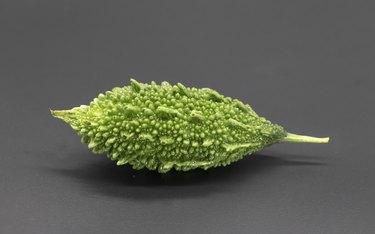
Bitter melon gourd is a nutrient-packed fruit commonly used in Indian and Chinese cuisine. It may be an acquired taste, but eating this gourd, also known as karela or balsam pear, offers a variety of nutrition benefits for skin, eye, brain and nervous-system health, among other good effects.
Bitter gourd "is a source of several key nutrients," explains a comprehensive review published by the journal Food Production, Processing and Nutrition on May 25, 2022. "It has a higher nutritional value than ... squash, pumpkin, cucumber and zucchini owing to its high mineral and vitamin content... The fruit is rich in vitamins, namely vitamin A, vitamin E, thiamine, riboflavin, niacin, folate and vitamin C. Similarly, it also has high amount of potassium, iron, calcium, magnesium, phosphorous and zinc."
Video of the Day
Video of the Day
However, the gourd's nutrient data varies depending upon whether you eat it cooked or raw. Read on for some facts about bitter melon's health benefits.
Bitter Melon Leaves Contain Nutrients, Too
The leaves of the bitter melon gourd plant are also nutrient-rich, though they have a different nutrient profile than the gourds do. Cooked bitter melon leaves, for example, provide significantly more calcium and vitamin A than the cooked pods. A one-cup serving of the cooked leaves also contains 205 micrograms of vitamin K, compared to just 6.9 micrograms in the cooked gourd, per the U.S. Department of Agriculture (USDA). And a one-cup serving of the leaves greatly exceeds the adequate daily intake for vitamin K, as recommended by the National Institutes of Health (NIH). Vitamin K is associated with bone health; it also helps blood coagulate. Because of that, people taking blood thinners should avoid eating bitter melon leaves or drinking tea made from them, since vitamin K can interfere with the action of those drugs.
Raw Bitter Melon Gourd Nutrients
Vitamin C
Yes, you can eat bitter melon raw. In fact, raw bitter melon pods provide the most vitamin C, at 78 milligrams per 1-cup serving, notes MyFoodData.com. That's 87 percent of the daily recommended intake of vitamin C, which makes the bumpy-skinned bitter gourd a good dietary option for those seeking sources of that vital antioxidant.
Your body needs vitamin C to repair injuries, including bone breaks and skin lacerations. "Research has found the vitamin to neutralize free radical molecules, which in excess can damage cells," observes the Harvard T.H. Chan School of Public Health. "Vitamin C is also involved in the body's immune system by stimulating the activity of white blood cells."
Folate
Raw bitter melon gourds provide a bit more folate than the cooked version, with a one-cup serving containing 17 percent of the recommended daily value. Folate, a B vitamin, "aids in making DNA and other genetic material," reports a November 3, 2021 article from the Cleveland Clinic. "It's also key in helping cells divide."
The folate found in bitter melon and other food sources is essential to good health, with benefits including lower blood pressure and a reduced risk of cardiovascular disease and Alzheimer's, says the Clinic.
Warning
Despite bitter melon's significant folate content, pregnant women should not eat it. "Bitter melon should be avoided if you are pregnant, as animal studies suggest it can cause developmental abnormalities," warns Memorial Sloan Kettering Cancer Center.
Cooked Bitter Melon Gourd Nutrients
Choline
Raw bitter melon contains zero choline, but cooked karela contains 13.9 milligrams of this essential nutrient per 1-cup serving, according to the USDA. The body needs choline to maintain cell membranes.
"All plant and animal cells need choline to preserve their structural integrity," explains the NIH. "In addition, choline is needed to produce acetylcholine, an important neurotransmitter for memory, mood, muscle control, and other brain and nervous system functions."
Lutein Plus Zeaxanthin
A cup of cooked bitter melon gourd provides 1,660 micrograms of lutein plus zeaxanthin per cup, says the USDA. Raw pods, by contrast, provide only 158 micrograms. Lutein and zeaxanthin are carotenoids that act in tandem to protect the eyes against macular degeneration due to retinal damage, as described by the American Optometric Association. They also protect the skin against sun damage from ultraviolet rays.
Potassium
A cupful of boiled bitter melon gourd contains 402 milligrams of potassium, while raw pods have just 275 milligrams. Potassium is an essential mineral that works with sodium, chloride and magnesium to maintain the body's electrolyte balance. Too little potassium — a condition called hypokalemia — causes weakness, lack of energy, muscle cramps, stomach disturbances and irregular heartbeat, as reported by the Mayo Clinic.
- Memorial Sloan Kettering Cancer Center: "Bitter Melon"
- Food Production, Processing and Nutrition: "A Comprehensive Review on Bitter Gourd (Momordica Charantia L.) as a Gold Mine of Functional Bioactive Components for Therapeutic Foods"
- National Institutes of Health: "Office of Dietary Supplements — Choline"
- American Optometric Associaton: "Diet and Nutrition"
- Mayo Clinic: "Low Potassium (Hypokalemia)"
- U.S. Department of Agriculture: "FoodData Central — Bitter Melon, Horseradish, Jute or Radish Leaves, Cooked"
- U.S. Department of Agriculture: "FoodData Central — Bitter Melon, Cooked"
- National Institutes of Health: "Office of Dietary Supplements — Vitamin K"
- MyFoodData.com: "Bitter Melon— Balsam Pear (Bitter Gourd) Pods Raw"
- Cleveland Clinic: "Folate Benefits and 13 Folate-Rich Foods to Try"
- Harvard T.H. Chan School of Public Health: "Nutrition Source — Vitamin C"